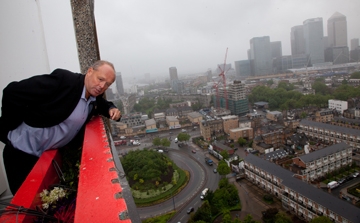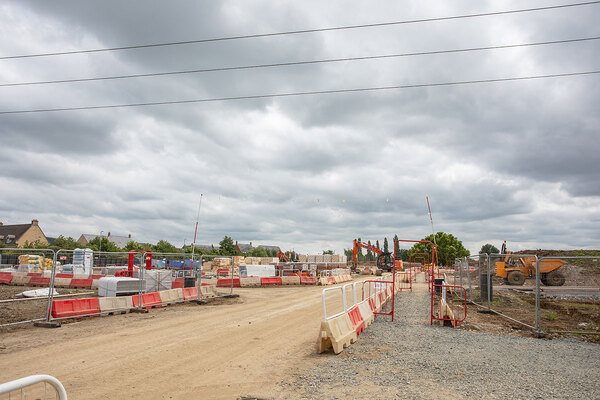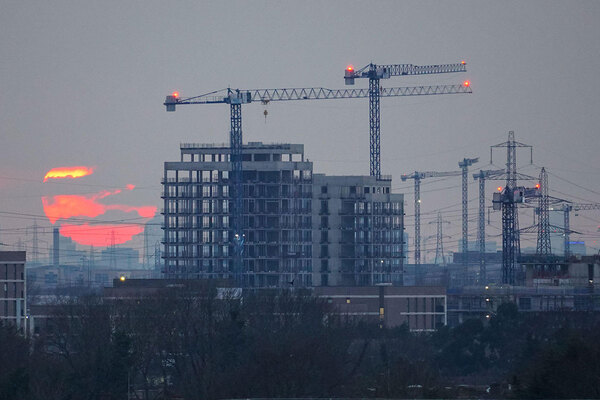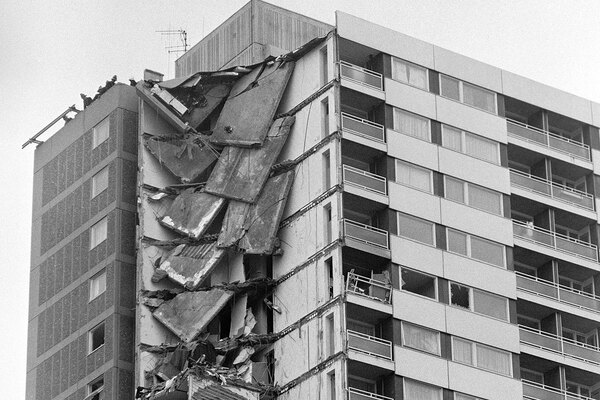All in his Stride
Incoming Chartered Institute of Housing president Steve Stride has uncompromising views and big ambitions for what social landlords can achieve. Nick Duxbury joins the Poplar Harca chief executive on a tour of the borough to hear his plans

It is raining in Poplar. It has been all morning, and will continue all afternoon: relentless, inescapable sheet rain. But Steve Stride, chief executive of 9,000-home Poplar Harca appears not to have noticed.
He pauses at the intersection of the Chrisp Street Market - ‘the first purpose-built pedestrian shopping area in the UK’ - where the upgraded shopping street joins meets the Lansbury estate, oblivious to the downpour, instead engrossed in the telling of his favourite story: the rebirth of Poplar.
As I cower under a flimsy £4 umbrella, Mr Stride uses his as a narrative aid, gesturing at the new market place, new shops, refurbished housing and new build blocks. For Mr Stride, the sun is always shining on this corner of east London - an area he has called home since moving to Brick Lane at 11 years old.
I am taking ‘the tour’ - a right of passage for anyone who is to be converted to the ‘Stridey’ way of thinking. Ahead of me, countless housing ministers, local politicians, chief executives, civil servants, investors, and tenants have trodden the well-worn route around Poplar to witness the transformational power of his vision. For all of them, the message is the same: landlords can deliver huge social changes beyond bricks and mortar.
Regeneration game
Mr Stride is a regeneration evangelist. He preaches a gospel of mixed communities, higher density housing and, above all, being agents of social impacts in health, education and employment. While many chief executives have become disillusioned with regeneration - burned by the failure of the housing market renewal programme, the credit-crunch collapse of development plans and council ‘visions’, often due to plummeting land values - Mr Stride has kept the faith.
Next week he will seek to convert the rest of the sector to his way of thinking on main stage at the Chartered Institute of Housing conference in Manchester.
The man who started from the bottom as an apprentice at Southwark Council in 1979, has been appointed president of the CIH - a position that gifts him a unique platform from which to influence both the sector and, in the run-up to next year’s election, the way it is perceived in government. So, what will he say?
‘I honestly think there is a silver bullet,’ he enthuses, as shoppers splash across our path in search of shelter.
This seems to contradict the message usually espoused at the CIH conference - that ‘there is no silver bullet’. So, what does Mr Stride’s ‘silver bullet’ look like?
‘Saying, “we’ll do this - give us some money”.
‘If we can show the impact we can have at a local level and deliver a massive increase in the number of homes - massive - then we can get £10 billion over three years.’
He suggests a ‘significant portion’ of this could be government equity loans such as those being piloted through the £150 million estate regeneration programme.
‘I think we go straight for the politicians and target them,’ he continues. ‘And it has to be about impact; the impact that we are guaranteed to have in each MP’s constituency.’
Poplar Harca has certainly had - and continues to have - a transformational impact on Tower Hamlets. Mr Stride leads me on his regeneration safari, pointing out a refurbished and new DLR station, a community centre and medical centre.
The most poignant benchmark for the rate of change in the area looms against the skyline: the iconic brutalist concrete monolith, the Balfron Tower.
Each of the flats in the Poplar Harca grade II-listed block is to be decanted and given a £140,000 refurbishment before being sold through a partnership with developers London and Newcastle, and United House. Such are the forces of gentrification in a overheating London market, buyers are already queuing up, and top floor apartments in the Erno Goldfinger-designed block are expected to fetch up to £750,000 each.
Fighting poverty
From a balcony in one of the run-down 27th floor flats, Mr Stride surveys his empire. The city is barely visible through the grey squall, but to the immediate south, the corporate glass towers of Canary Wharf serve as an reminder of the divide that remains between Poplar and prosperity.
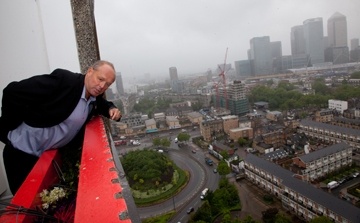
Source: Jonathan Goldberg
Steve Stride surveys Poplar Harca from the 27th floor of Balfron Tower, which is being redeveloped into modern flats
Poverty is something 56-year-old Mr Stride has seen first hand. From the age of 12 he worked for a homelessness charity for single people, Brick Lane, of which his pastor father was the chair.
‘I was the night warden,’ he recalls. ‘This was looking after 18 homeless alcoholics every night and I was 16 by this point. I got a real feel for housing need and homelessness then.’
Mr Stride went to a ‘s**t school’, and was one of just 10 pupils in his year of 120 who went on to university. When he emerged with a geography degree from Southampton, he was already under financial pressure. At the age of 21 he had a family to support and was living with his mother-in-law. It was then that Mr Stride secured a place on a housing trainee scheme at Southwark Council.
As part of this, he was required to become a member of the CIH and undertake its housing course, which the borough paid for, enabling him to study on day release. This was to be his salvation.
‘I was just starting out, I had two kids to feed and didn’t have a pot to piss in. It’s significant that financially I had nothing, but because of the support I got from Southwark I was able to get a decent start.’
Today Mr Stride is one of the sector’s most vocal champions of apprenticeships, and a backer of Inside Housing’s Homes Work campaign.
‘I know how important apprenticeships are - and I know the barriers. I could have hit those barriers and not gone further.’
But he did go further. Upon ending his traineeship at Southwark, which he found to be an ‘overly bureaucratic’ council, Mr Stride took a job at Tower Hamlets Council as an estates officer.
There he earned a number of promotions, eventually becoming the equivalent of assistant chief executive for one of a series of neighbourhoods in the borough where he managed all non-housing services: environment, planning, social services, youth services and community education.
He went on to head up the council’s regeneration, and then lead the stock transfer which bore Poplar Harca - but throughout all of this it was his experience in the neighbourhoods team which shaped his firm belief that housing should be about more than just homes. In fact, the term ‘social housing’ is notable by its absence from Mr Stride’s ‘silver bullet’ pitch to the government.
‘It’s an immediate turn-off,’ he explains. ‘We need to stop talking about it all the time. [The government] is not so interested in social housing because all the same old stereotypes come in.
‘At the end of the day you will get a lot of senior housing professionals saying “let’s fight the fight for social housing” but would they ever be seen living in social housing? Not in a million bloody years. People need to come to terms with the fact that they are not in favour of social housing when it comes to their own personal lives.’

Source: Jonathan Goldberg
Steve Stride meets two Willmott Dixon apprentices building on a private rented development in Poplar
Another complaint from Mr Stride is that landlords aren’t doing enough. He expresses frustration that while 8,682-home Poplar Harca is stretching itself to make the greatest possible impact on the local area - the organisation has built 1,000 homes, is on-site with 1,000, and has another 1,000 homes in the pipeline - many associations are not. He therefore has little time for smaller associations that are sitting on assets such as land and playing it safe.
‘I would force change,’ he says. ‘That might be controversial but… I think it could be done through partnership.’
By this he means landlords would allow more ambitious partner organisations to use their assets and balance sheets to build.
Frank views
Some housing professionals may be prickly towards Mr Stride’s blunt critiques. However, Keith Exford, chief executive of 50,882-home Affinity Sutton, welcomes his candour.
‘It’s good to have someone outspoken [in the role of CIH president] as the sector is often guilty of not being outspoken enough,’ says Mr Exford, who has, of course, also been on the Poplar tour.
But Mr Stride has a strong track record for winning hearts and minds. The creation of Poplar Harca in 1998 - the first urban large-scale private financed stock transfer in a Labour council under a Tory government, in a neglected, poor part of east London - is testament to this.
His methods of persuasion are not all down to charm. Mr Stride is a self-confessed ‘street-fighter’. He is speaking figuratively. Probably. Either way the burly east Londoner clearly relishes a political scrap. He says lobby group Defend Council Housing was set up chiefly to fight Poplar Harca, reminiscing about the confrontations and campaigns.
Eileen Short, chair of Defend Council Housing, says Poplar Harca has ridden off the back of the huge inflation of land values as a result of what has happened in Canary Wharf and is now making Poplar unaffordable. She claims there has been a net loss of social housing - a claim denied by Poplar Harca, which says there has been a net gain of 600 social rented homes.
‘Talking about creating mixed communities is a one-way street because what he really means by that is taking public land and public housing and creating housing for sale that most people who live here can’t afford,’ Ms Short says. ‘The net effect has been worse housing problems for people in Tower Hamlets.’
Political foe
This was a view shared by Mr Stride’s most high-profile adversary, George Galloway. The controversial Respect Party politician was an MP for Bethnal Green and Bow from 2005 until 2010, during which time he vocally opposed a series of stock transfers to Poplar Harca which meant going head to head with Mr Stride, who was balloting for residents’ votes.
To win the all-important ballots, Mr Stride called on his experience canvassing for the Labour Party - of which he has been a member since he was 18, and for which his daughter is standing as MP in Harlow - and hit the streets. His persistent approach was effective, but nearly got him arrested for harassment.
‘You go out on the street, you harass them, you follow them down the street,’ he explains.
These tactics were ultimately successful. And when in 2010 Mr Galloway stood for election as an MP in Poplar and Limehouse - once again opposing stock transfer - he ended up in third place, a result Mr Stride regards as a personal victory after years of fighting to win over residents.
‘We are bitter enemies,’ Mr Strides states. ‘Opposites. So I either cut his throat or he cuts mine. I managed to cut his throat.’
Mr Galloway claims not to remember Mr Stride. However, responding to Mr Stride’s suggestion Poplar Harca played a role in his electoral defeat, he says: ‘He seems to have a fair conceit of himself… they’ve probably had to extend the doorways in the Harca offices to accommodate his ego.’
Future vision
Mr Stride’s tenacity and powers of persuasion are to be put to the test again in delivering his latest grand plan: to turn Poplar into the next Shoreditch. He envisions a ‘tech city’ of post-industrial offices serving as hubs for trendy tech-start-ups that are being priced out of Old Street’s ‘silicon roundabout’. It is likely there will be a few more tours to do before the hipsters show up - but it is an increasingly conceivable possibility.
However, a new threat hangs over this vision and others. The government’s confirmation last month that it is scrapping rent convergence - the process of gradually increasing social rents until they align with a formula-based ‘target rent’ - could jeopardise many of Mr Stride’s plans.
This is a blow to many landlords because it means a reduction in expected income over the life of their business plans.
The effect is especially acute for stock transfer organisations with big piles of debt such as Poplar Harca. Mr Stride declines to comment on the details of what the financial hit could be, but he acknowledges that it could be substantial. His hope, however, is that he will win the association an exemption.
It is no coincidence then, that the last person to go on ‘the tour’ before me was Matthew Bailes, director of regulation at the Homes and Communities Agency. He is now confident that Poplar Harca won’t be told to stop building as a condition of a HCA waiver.
He adds he is encouraged by the HCA widening the premise for waivers to include commitments made to tenants and local authorities.
‘We will sort out some kind of deal,’ he says. ‘Matthew [Bailes] has told me there is no way he wants to see us stop our plans - there will be a way. We are unique.’
But what if the Treasury won’t allow it?
‘If we don’t [get a deal] there will be a bloody war,’ he growls, perhaps noticing the rain for the first time.
Steve Stride is speaking at the Housing Heroes dinner at the CIH conference on Monday 23 June
Campaign aims and how to get involved
- For residential developers across the UK to publicly state the number of apprenticeships they are providing on building site hoardings
- For housing associations and councils to pledge how many apprenticeships and training opportunities they will provide directly and through their supply chains in 2014/15
- To support the creation of a web resource by Inside Housing that schools and colleges can use to find out about apprenticeships and training opportunities offered by UK housing providers
To find out more about the campaign and how to get involved, visit www.insidehousing.co.uk/homeswork or to sign up, email gene.robertson@insidehousing.co.uk


